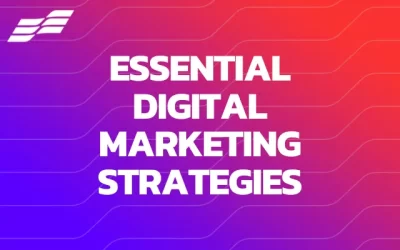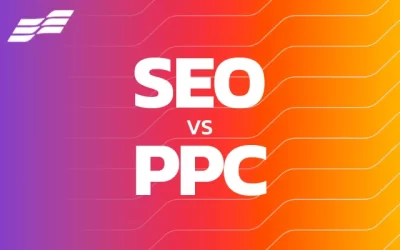PPC advertising is a fantastic digital advertising channel for businesses of all sizes. As a business owner or digital marketer, you control how much you spend on ad placements, as opposed to traditional media where rates are preset.
The big question is, how do you get the most out of PPC advertising? First, let’s review and dive into what PPC advertising is. PPC or pay-per-click is a type of digital advertising. This involves businesses paying a fee or a ‘pay-per-click’ each time one of their ads is clicked on.
One of the most popular forms of PPC is search engine advertising. A business pays for ad placement through this channel when someone searches for a keyword relating to your business.
5 Things to Consider When Creating an Effective PPC Strategy
1. The platform.
There are so many digital marketing channels you can run PPC advertising on. Choosing the right one is critical to your success, but there is also no right or wrong answer.
You see, it entirely depends on your business and customers. We’ll talk more about your audience later on, but knowing who you are marketing to will help you choose the right platform and ensure you are creating an effective PPC strategy. Some of the most popular PPC platforms include:
Google Ads
Google Ads (formerly Google AdWords) allows you to reach up to 90% of the world’s interview users, targeting your audience based on search terms. This puts you in prime position in search engine results, on other websites, on YouTube videos and more of Google’s vast ad network.
Meta Ads (AKA Facebook, Instagram & Messenger Ads)
Meta Ads lets you create video, image, text and carousel ads to put in your target audience’s Instagram and Facebook feeds, stories, reels and more. It largely uses targeting through demographics and user interests, which you can set.
Twitter Ads
Twitter is a diverse, fast-moving marketing platform, but it isn’t ideal for every business. It comes down to if your ideal audience is on and regularly active on the platform to decide if it’s the right option for you.
TikTok Ads
TikTok is an authentic and honest space to connect with your audience on another level. However, to be successful on TikTok Ads, it does rely on creating more laidback, natural ads, rather than traditional formats you may be used to.
LinkedIn Ads
For B2B (business-to-business) businesses, LinkedIn is an invaluable platform, if used correctly. It can help you target ads by job title or by industry, allowing you to get in front of very specific people.
2. The goal.
Knowing your goal is very important for creating an effective PPC strategy. Do you need more leads? Are you wanting to increase your brand awareness? Do you want to sell more products online? Is it physical store visits you’re trying to encourage? By knowing your goal, you can most efficiently create your ads to ensure they’re delivering you the right results.
The goal you choose for your PPC campaigns will also impact what type of ads you run. For instance, if you’re experiencing cart abandonment, and you’ve invested in optimising your pages, then re-marketing may help bring people back to your website to complete their purchases. In fact, re-marketing can increase the likelihood of someone picking you over a competitor by more than 70%. But this is one of hundreds of scenarios you can use to determine the best ads for your business.
3. The audience.
With so many different types of PPC platforms and types of ads within them, knowing your audience will help you choose the right platform to get you a good return on your investment. It can also help you provide more accurate data to optimise your ads more efficiently, including the audience targeting, copy and imagery.
Who your audience is will also help you with finding the right keywords. Both short-tail and long-tail keywords have their place in a PPC campaign, as well as negative keywords, and knowing who is most likely to be searching for what and what stage of the buying cycle they’re in will help you make the best use of them.
4. Data tracking.
Data plays an important role in creating an effective PPC strategy, and can (and should) be used to further optimise your campaign. Advanced conversion tracking can help you track the interactions people have with your business following seeing or engaging with your ads. With many platforms attributing to views on your website, setting your ad conversion tracking up properly will ensure you know exactly where your website visitors, leads and/or sales are coming from, giving you a more accurate overview of your return on investment.
The data your ads provide should also be put back into your marketing. For instance, you may notice trends of when your ideal customer is online, what they’re looking for or how they’re using your website. This can all help you further optimise not only your PPC campaigns, but your website and other marketing.
5. Optimisation.
Your ads are not a set and forget. To create an effective PPC strategy, you should be performing regular checks, analysis and optimisation of your ads and landing pages. This may include adjusting your budget, keyword inclusions or exclusions, further optimising your landing page to improve the user experience, run an A/B test and more. All decisions should be based on data to make sure you’re not just guessing what will work, but making educated optimisations to increase your return on investment.
BONUS TIP: Be realistic
Not all advertising budgets are created equal, and you should keep setting realistic expectations for your PPC campaigns. This is not to say that a small budget won’t get results, but you need to be realistic about the number of people you will reach based on the budget you are investing and who you are trying to target. For example, someone in a more competitive area or industry will need to invest more to get the leads that they find will be the most impactful for their business.
To help make the most out of your PPC ads, add value to your customers with interesting copy. Consider a creative headline, description and visual that’ll grab their attention. To create engaging content, consider all the above strategies, including the right keyword, platform, and audience. The culmination of these factors will elevate your business and help deliver the return of your PPC investment.
Frequently Asked Questions About Effective PPC Strategies
What exactly is PPC?
PPC, or pay-per-click, is a digital advertising model involving ads you only pay for when a user clicks on the ad. It’s a common paid ads method available on search engines, social media and other advertising platforms, allowing advertisers precise targeting, budget control and detailed campaign performance measurement.
While PPC is a powerful tool for driving website traffic, generating leads and boosting sales through platforms like Google Ads and Meta Ads, it can be difficult for inexperienced advertisers. Knowledge of how to bid on specific keywords and placements, keyword utilisation, landing page optimisation, ad copy optimisation, the ad auction and more are required to generate powerful results as a business. This is why PPC strategists can be very useful to get the best results from a PPC campaign.
What does a PPC strategist do?
A PPC (or pay-per-click) strategist is an expert in planning, creating and optimising PPC advertising campaigns. Their goal is to provide a good return on investment, driving quality traffic, increasing conversions and making the most of advertising budgets. What a PPC strategist does is extensive research into the business, market and best PPC strategies to implement, before setting up the ad, creating engaging content, fine-tuning bids, and conducting A/B tests, optimising landing pages and more to grow results over time. Their experience and knowledge is invaluable for a business looking to get a positive result from Google Ads, Meta Ads and more.
Is PPC a good marketing strategy?
PPC, or pay-per-click, can be a highly effective marketing strategy for businesses looking to achieve specific results fast. It offers several advantages over other marketing strategies, including precise audience targeting, rapid deployment and strict budget control. Using PPC allows businesses to reach potential customers at the exact moment they are actively searching for products or services, making it an excellent tool for generating website traffic, leads and sales. The ability to meticulously track and adjust campaigns also makes it highly effective long-term.





